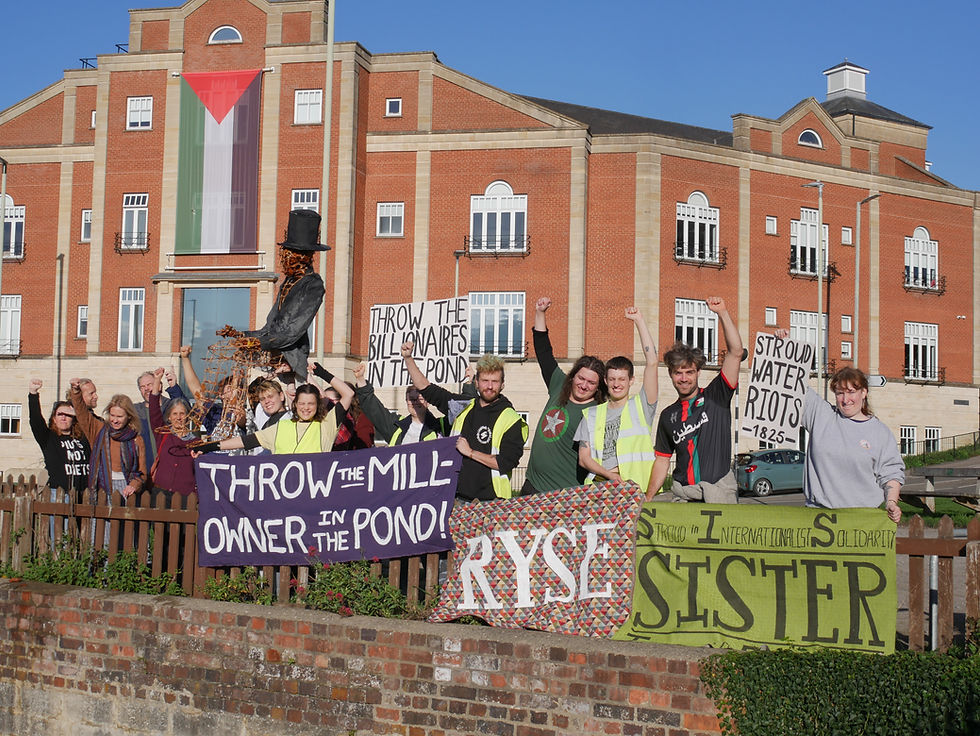Learning the lessons of the Stroud Water Riots
- Roma
- Nov 19, 2025
- 7 min read
Updated: Dec 4, 2025
"The best pages of history are the ones ordinary people of conscience decided to write" - Kofi Klu
On a surprisingly sunny Saturday at the start of November, around 100 people gathered with us at the top of Stroud High Street and paraded a wicker effigy of a mill owner through town and to Wallbridge, where we threw him five meters down into the canal. We picked up more people as we marched, and the final crowd numbered over 200.

This event was a collaboration between us, the RYSE, local artists Emily Joy and Ali Cockroft at Periscope, Emma Kernahan of Dialect Rural Writers collective and other local organisers coming together as SISTER (Stroud in International Solidarity Together for Earth Repairs) to mark two hundred years since the Stroud Water Riots.
The Stroud Water Riots were a series of protests that took place throughout the year of 1825 and were started by mill workers who were being paid poverty wages and couldn’t afford to live.
As a speculative piece from local radical historian Stuart Butler says "The Good Book tells us that we should get our bread by the sweat of our brow. We had the sweat but no bread. What could we do?"
21 protestors were arrested and many imprisoned at Horsley correctional facility, where they would have been subjected to hard labour. They threw mill men and strike breakers into the mill ponds and in Wotton-Under-Edge they burnt their looms. The strike gathered 6000 at Selsley, 3000 at Stinchcombe and catalysed solidarity strikes from stonemasons and carpenters.

This event is part of our commitment to the building of the Decolonial Open Communiversity, (DOC) in our retrieval and revival of our community’s anti-colonial histories of resistance. The DOC is a space for all peoples from across the world to share their diverse cultures, wisdoms, knowledges, skills, understandings and contexts in order to effectively unify our paths to repair humanity and our Mother Earth. If we have any chance of moving forward as humanity it depends upon us learning from our victories and failures of the past and applying these lessons today with courage, conviction, creativity and principles.
With these intentions, the DOC encourages people from around the world to tell the stories of resistance to power and injustice in their communities, learning from history and from each other to create more imaginative and affective action that can change the world for the better.
You can watch the DOC launch video from participating organisation the FENMUCARINAP here.
It's important that we understand our local radical histories to dispel the myth that we do not have rich and powerful peoples stories - we do not have to learn the history and the legacy of the mill owner Marling, we can learn the legacy of the workers who he exploited and who rose up against him. They rose up for their dignity and if we see those people as our ancestors, more than imagining ourselves as "temporarily embarrassed millowners", then maybe we'll want to fight for our dignity and for the dignity of our siblings. If we learn the history of the millworkers fight, then we might look at striking workers, revolting communities and peoples resistance not as an inconvenience but as our family.
We also chose this event because it illustrates so clearly the global links that Stroud had in the 19th century, and the role that exploited workers in the imperial core played in the colonial project.
As Stuart Butler puts it: "We can see, therefore, that there are both local and national contexts to the weavers’ action in Stroudwater in 1825 – but there is also an international one: the prosperity of the region (Stroud scarlet cloth for uniforms for example) was tied not just to the aggrandisement of the East India Company but also to the martial nature of the spreading British Empire, and Great Power wars."
The scarlet cloth he mentions here is the cloth that many of the mill workers would have been producing dyed with the cochineal insect, harvested on colonised land in Mexico by enslaved peoples.
Stuart mentions that colonial conflicts, including: the West Indies, the Kandyan Wars, Australia, Ireland, Sierra Leone, the Ashanti Wars, Turkey, Cape Colony, the Persian Gulf, America, Borneo, and Java, increased the demand for the cloth and uniforms made in these valleys.
This might seem like a tension - why would we glorify those who produced this cloth in demanding better compensation for their contribution to imperial harms? But to us, this is exactly the tension that we are trying to work between.
And the clear outcome of this tension is that at the end of the day, there are men and people in power who benefit from both kinds of immiseration and cloak this through setting one group against the other. Those who worked in the mills here did not have other options, this was the work available if they wanted to feed their families - and even then it barely covered that. And it is powerful to remember that even in the face of incredible adversity and poverty, they still rose up and made sacrifices in hopes that the world could be better.
We read out the names of those arrested and their punishments, and this is most likely the first time in centuries that their names have been spoken aloud in their home valleys. We remember them and in so doing also make a promise to the people of today who sacrifice for a better world that we will remember them and fight for them as well.
I'm writing this up on day 3 of the Filton 24 court case, where activists who have been imprisoned for over a year on remand (despite never being declared guilty by a jury) will fight to prove their innocence in trying to stop the genocidal Israeli war machine. They have made massive sacrifice, and in remembering those imprisoned and sentenced to hard labour during the Stroud Water riots, we also commit to fighting for the freedom of the Filton 24.
In reclaiming the history of those to rose up against the mill owners on all sides of the world, we see a pattern that encourages us to work together for the dignity of everyone and our interests as intertwined with those of our siblings.
Which leads us to the other elephant in the room - these riots were all well and good, but what did they actually achieve? What lessons can we learn from this action?
In practical terms they didn't achieve a whole lot. The wages did not go up, the working conditions did not improve and the cloth continued to be made. Many of those who took action were imprisoned and sentenced to hard labour.
Which is shit.
But we can learn lessons like: resistance is possible and vital here. Strike breakers and mill owners deserve to be dunked in ponds. The fight for dignity will echo down the centuries. When we don't link internationally, the ruling class can snuff outyour fight far easier.
That's why we hosted this event to throw a wicker mill owner in the pond - despite our attempts to convince Stroud MP Simon Opher that he should let us throw him in.
(He was surprisingly up for it - so maybe next year hey Simon?)
The plus side of using wicker is that he was mostly hollow, and so we handed out autumn leaves and asked everyone present to think of something they wanted to throw into the canal - patriarchy, colonisation, homework, the department for work and pensions, and a particularly disliked classmate (this was an intergenerational event). They then stuffed the leaves into the mill owner, and they all went into the canal together.
So we threw a wicker effigy of the mill owner into the pond, accompanied by chanting and cheering.
As it hit the water with a modest splash, the ladder that we had carried the mill owner down the hill on rose up in the air. In the lead up to the event, we ran two workshops where community members learnt together about the riots and the global context, and got them to design their own symbols of resistance and turn them into flags which were then fixed to the ladder. As it rose up, the flags flew high in the wind.
Our flags included a stray cat, a loom, a soup pot and an oak leaf. These were fixed next to symbols from communities that are also taking part in the Decolonial Open Communiversity - including the symbol of the day: the Sankofa bird.
The Sankofa is an adrinkra symbol, used by Afrikan organisers but originally from the Akan people in what is now known as Ghana. Its name comes from the Twi expression, “San kɔfa!” literally: “Go back and get it!” a command to pay attention to the lessons of the past and take them to inform the present and the future.

We also sung music, lead by the local Cryptids folk choir that celebrate peoples history. This included John Ball, a ballad about the 1381 Peasant's revolt and Ashes, a modern song by the Longest Johns about celebrating and doing culture rather than preserving it behind glass.
So nothing too on the nose.
No sooner had the event finished, people came up to us and asked if it would happen again next year. The answer to this is yes probably - and if you're interested in making it even bigger and better, please contact us at theryse@riseup.net and we can work together next year. But between now and then, the work to rewrite the story of our place in the world and pull our little community into a global fight against imperial violence continues.
Namely: on the 14th of December from 4-9pm at the Trinity Rooms Community hub, where you can come share an evening of Christmas cheer and celebration of community wealth and generosity. A chance to buy beautiful unique, handmade, artisanal gifts, have fun with games and festive treats, and join us in shaping a collaborative play that digs into a big question: What does “wealth” really mean—and how do we grow it together?
To draw this blog to a close, a reminder of the core messages from the Stroud Water Riots - that solidarity with all peoples in resistance is key, we all fight the same enemy and if you don't catch on and continue to work against the peoples freeing themselves: you'll end up in the pond.

Thanks to Unite the union Gloucester district branch for their generous support of this event!


















Comments